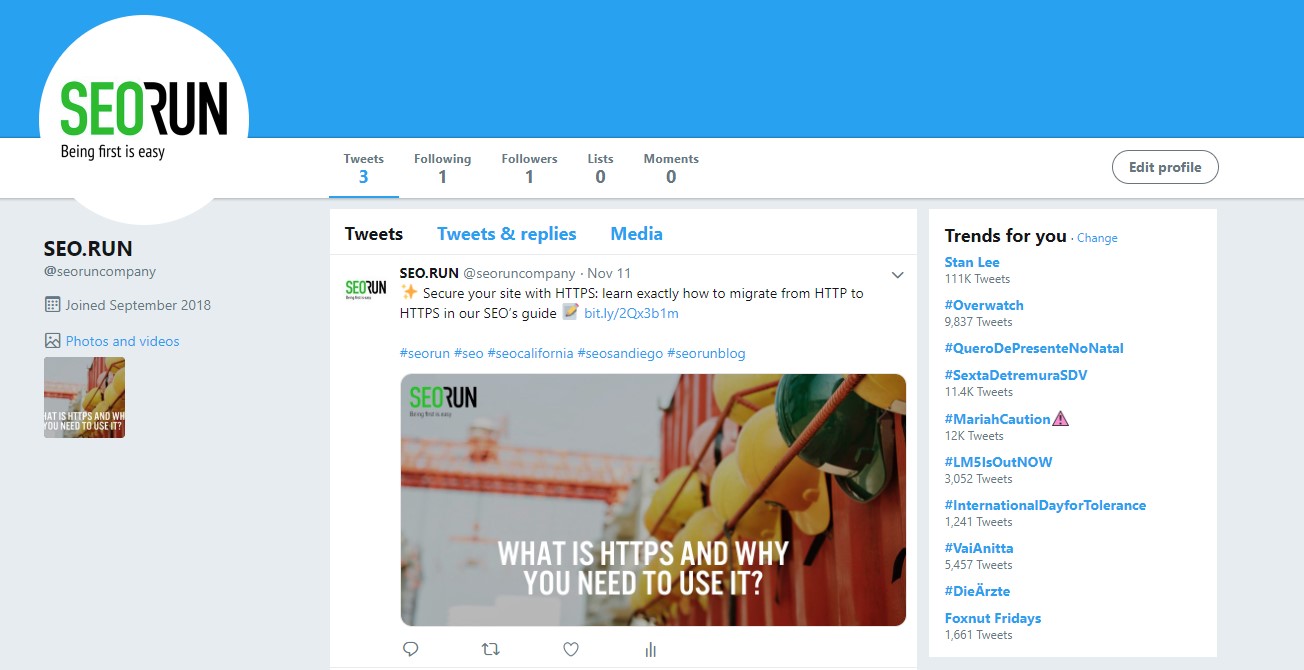SEO and SMM: What’s the Difference?
SEO and SMM are different areas of digital marketing, yet they are very much connected: both generate website traffic. You don’t have to choose one of the branches because they work better together and both can increase your conversions.
SMM is an abbreviation for social media marketing, SEO stands for search engine optimization. While the former works on social media (Twitter, Facebook, Pinterest, and others), the latter works in the search engines (Google, Bing, Yahoo.)
The primary SEO objective is to get the website to the top of the search engine results page for relevant keywords; the main purpose of SMM is to build a community of engaged people around the brand.
So, the goals are achieved by different means: for SEO, you write texts, improve your website load speed, fix technical issues, and for SMM, you create and manage social media profiles and groups, set up targeted ads, and curate your content plan.
SEO is about working with people and PC requirements, SMM is mostly about people.
Both SEO and SMM eventually promote a product or service, so they influence each other. The influence of SMM on SEO begins with social signals.
Social Signals for Website Promotion
Social signals are all reactions of users to your posts:
- likes;
- reposts;
- discussions;
- shares;
- comments;
- the total number of followers/group members.
The impact of social signals on the website promotion is the most positive and notable.
SMM and Google SEO are connected: the company has stated that Twitter and Facebook links influence rankings. However, Google robots pay more attention to the authority of the social profile, and the links remain nofollow. Activity in social networks can affect the position of the site in the search directly and indirectly.
Direct ranking factors are:
- The social signals mentioned above: the activity of users in a group/on a public page is monitored and analyzed by the search robots, and links to social profiles often appear in the SERP along with the main site.
- Traffic. If you publish interesting content on your website and publish links to it on social media, the users click them. Then they share those links with their friends or repost them to their feeds and so your traffic grows.
- Links themselves. Even if they are not indexed, they still count as bonuses to the website credibility.
Indirect ranking factors:
- Behavioral factors. Their impact is huge, and search engines actively monitor these metrics: average read percentage, time on page, exits and more. You must admit that a user who clicked to your website from a social media post is more engaged and likely stays there longer because he/she represents your target audience and your social media content is relevant to his/her interests.
-
Search crawlers track any user interaction on your website and social media profiles, so add social buttons to your website. This integration is certainly helpful.

- Speed. Social posts and links get indexed faster than blog articles. Social media are crawled by fast bots that help search crawlers discover new web pages.
Social Media for SEO: Things to Consider
Our optimizers conduct the SMM audit to identify factors that are most important to search engines:
- The presence of links to the website and branded social profiles on the targeted social networks;
- The operative condition of social buttons on the website;
- The presence of share buttons;
- The presence of actual contact info, such as phone numbers, email and physical addresses;
- Regular updates on the company’s social profiles;
- Using hashtags in posts;
- Sharing new website content on social media;
- The presence of the Open Graph protocol.
So the main thing here is to get social profiles, integrate them with your website, and keep them current; social links are a more complicated story.
Social links do not contribute to your link mass, so they do not impact your rankings directly, but you can use social media features to generate traffic and engagement from social networks.
-
Twitter. Search engines love this platform, but your Twitter account must be popular: get likes, retweets, and comments. There’s hardly any sense in gaining Twitter follower base by using bots.

- Facebook. From the SEO standpoint, Facebook is vague: the links are hidden with “nofollow” but we’ve noticed that Google ‘sees’ and indexes them. Search bots also take likes and shares into account, increasing a website’s authority. Moreover, on this social network, you can like a page itself, not just posts, and these likes impact the website ranking. Plus, Facebook is one of the most influential social media, it has numerous advertising tools and a more engaged audience. To create a community on Facebook is to meet your target audience face to face.
- Google Plus. In 2013, Matt Cutts, the head of search quality at Google claimed that getting +1s were not a ranking factor, however, the Moz blog published a blog post on the correlation between the number of +1s and high rankings in Google. If leading and reputed resources share a popular post on Google+, it equals a backlink from a credible source. At the same time, cheating is easily detected, so we do not recommend anyone to participate in such frauds.
- YouTube. SEO efforts on YouTube make sense if there’s compelling content that fits the video format. The social activity expressed in views of your videos, subscribers, and link clicks will generate traffic.
SMM and SEO is a working tandem of Internet marketing, which is useful thanks to its interconnection.
Despite difficult relations of search engines and social links, user activity on any connected resource improves SEO of a website.
You need to focus on content. Quality content attracts users from both social networks and search.
Prices for SMM and SEO may vary, but, in order to increase brand awareness and conversion, it’s smart to use both tools rather than stick to just one of them.





